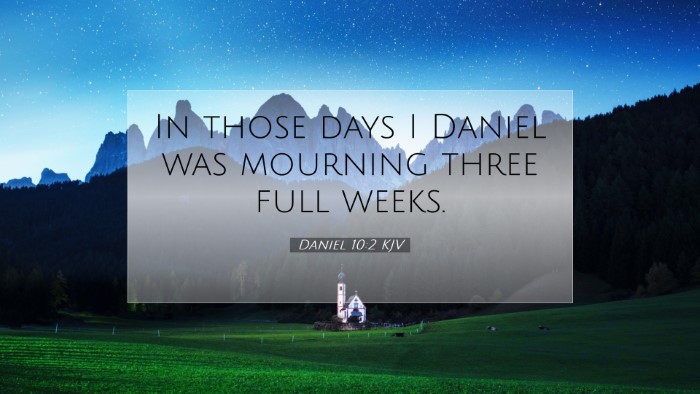Old Testament
Genesis Exodus Leviticus Numbers Deuteronomy Joshua Judges Ruth 1 Samuel 2 Samuel 1 Kings 2 Kings 1 Chronicles 2 Chronicles Ezra Nehemiah Esther Job Psalms Proverbs Ecclesiastes Song of Solomon Isaiah Jeremiah Lamentations Ezekiel Daniel Hosea Joel Amos Obadiah Jonah Micah Nahum Habakkuk Zephaniah Haggai Zechariah MalachiDaniel 10:2
Daniel 10:2 KJV
In those days I Daniel was mourning three full weeks.
Daniel 10:2 Bible Commentary
Commentary on Daniel 10:2
Daniel 10:2 states, "In those days I, Daniel, was mourning three full weeks." This verse serves as a critical entry point into the profound spiritual and prophetic context of the Book of Daniel. A deep examination reveals the themes of mourning, seeking God, and intercession that are pivotal in understanding the overarching message of this chapter.
Contextual Background
To adequately comprehend Daniel 10:2, one must consider the historical circumstances surrounding its writing. This period is situated during the Babylonian exile, approximately in the year 536 B.C., following the decree of Cyrus that allowed the Jews to return to Jerusalem. The tension between the returning exiles and the ongoing spiritual crisis within the community underscores Daniel's mourning.
Mourning as a Spiritual Response
The phrase "was mourning" indicates a profound emotional and spiritual struggle. Public domain commentators like Matthew Henry highlight the significance of Daniel's mourning as a combination of personal grief and corporate lament on behalf of his people. This duality suggests that Daniel not only mourned for his own situation but also shared in the collective suffering of the Israelites.
According to Albert Barnes, the term "mourning" can imply both fasting and prayer. Daniel's extended period of mourning—three full weeks—emphasizes his earnestness and desperation in seeking divine intervention and guidance amidst a dire national crisis. This reflects a spiritual discipline that resonates with believers facing trials and interceding for their communities.
Theological Implications
The act of mourning in biblical texts often serves to invoke God's attention. As Adam Clarke states, the earnestness that accompanies mourning is not merely an emotional response, but a theological act of faith. Daniel’s mourning signifies his awareness of the need for God’s mercy and guidance; it demonstrates a deep recognition of human frailty compared to divine omnipotence.
Moreover, Daniel's mourning provides insight into the nature of prayer and supplication. As noted by Matthew Henry, extended periods of prayerful waiting can reveal a profound trust in God's timing. Daniel embodies a model for modern believers, encouraging a persistent and heartfelt approach in seeking God’s face in challenging circumstances.
Lessons on Spiritual Leadership
In a pastoral context, Daniel serves as a model of spiritual leadership. His actions reflect a leader who recognizes his responsibility to intercede on behalf of his people. The lesson here is that mourning and supplication should be integral components of a leader's life. Albert Barnes provides wisdom in showing how leaders must sometimes shoulder the burdens of others, leading them into periods of prayer and lament, which can foster community healing and restoration.
For theological students and scholars, it is crucial to note how Daniel's mourning was not passive but actively engaged with the spiritual realm. This aligns with the broader biblical narrative, affirming that God responds to the prayers of the faithful. As Daniel engaged in heartfelt mourning, he positioned himself to receive revelation from God, emphasizing the symbiotic relationship between human earnestness and divine response.
Application for Pastors and Believers
For pastors today, reflecting on Daniel's example invites a deeper exploration of congregational health and spiritual vitality. How often do church leaders call their congregations into seasons of earnest prayer and mourning? Matthew Henry encourages believers to cultivate sincere hearts that seek God's will through mourning for their communities and the church at large.
Additionally, the communal aspect of mourning for one's people underlines the responsibility of the church to be a place of healing. Adam Clarke indicates that the church should create environments where individuals can express grief and seek God collectively, fostering a spiritual atmosphere conducive to receiving God’s grace and revelation.
Conclusion
Daniel 10:2 encapsulates a profound insight into mourning as a spiritual discipline marked by sincerity and earnestness. By understanding the context and implications of Daniel’s mourning, pastors, students, and scholars can draw invaluable lessons on intercession, leadership, and the nature of prayer. The spiritual journey of mourning is not just an emotional exercise; it is a pathway to divine engagement and revelation.


